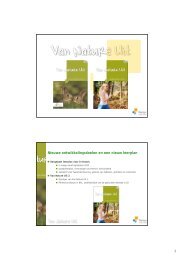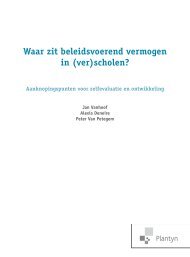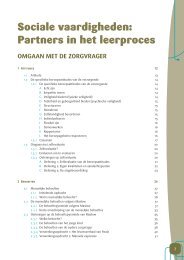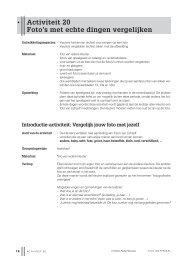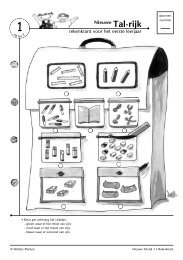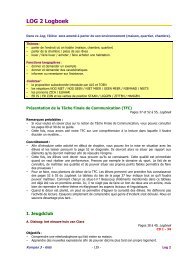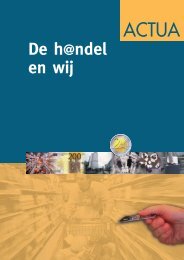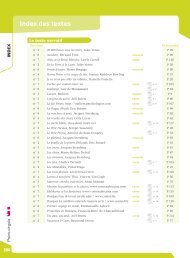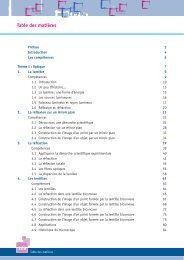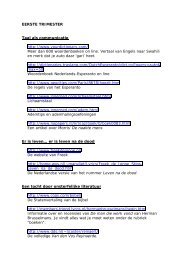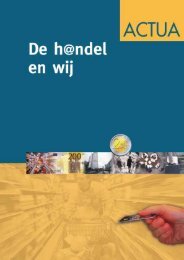1 - Plantyn
1 - Plantyn
1 - Plantyn
- No tags were found...
You also want an ePaper? Increase the reach of your titles
YUMPU automatically turns print PDFs into web optimized ePapers that Google loves.
Life at school in the USA unit 1Pre-readingTalk about answers to these questions with partners and with the class.(For questions 4 to 7 you can use 2 nd and 3 rd conditional clauses. See Contact Grammar n° 16.2.2 andn° 16.2.3.)1 What images cross your mind when you think of American high schools?2 Was any American high school in the news lately?3 Do you know any stories or fi lms featuring life at an American high school?4 Suppose you had woken up somewhere in the USA this morning, how would you probably havecome to school?5 How many subjects would you have?6 What time would school end every day?7 What would you do after school? Where would you spend your after school time?Reading comprehensionSamantha Blevins is an American high school student from Port Townsend (Washington state). Read howshe introduces herself and her US high school.Port TownsendSeattleOlympia SpokaneNTON(state)Mount St. HelensSalemCNONTNHelenaOONOPacific OceanCLONBoiseNONCheyenneunit1Sacramento Carson CitySan FranciscoSalt Lake CityTCOLOODenver11
45505560657075when my shift ends. I also take an English classat Peninsula College from 6:00-8:30. The restof the evening I spend doing homework orwatching the occasional TV show until I go tobed at 11:00.A school year consists of two semestersand lasts from the beginning of Septemberto the middle of June. The first semester endssomewhere around January 20th depending onhow the days fall. It always ends on a Friday.The American school system is based ona theory that you need a certain amount of credits in orderto graduate. Credits are accumulated by semester. Two semesters of coursework equal onecredit. The classes you need to receive these credits are taken over a period of four years andinclude such subjects as English, history, mathematics, science, physical education, etc. Theseclasses are compulsory. We are also required to take a certain amount of optional classes thatare called electives. These are classes you maychoose from, such as photography, drama, art,music, cooking, dance, mechanics, etc.The most classes a student can take at thehigh school is six, but often students havefewer if they have accumulated enough creditsand don’t wish to take extra classes. Somestudents take seven or eight classes, the extrasfrom places such as Peninsula College. It ispossible to switch classes considered elective.Academic classes such as math, science, history,and English run the entire year, although it ispossible to drop out half way through the yearand complete the last portion of the credit atanother time.In American schools any form of religion in the curriculum is strictly prohibited. If ateacher is to express any religious opinions or preferences they will be harshly punished or evendismissed from their jobs. While religion is banned, the American flag is mandatory inall classrooms and every morning the principle leadsus in the Pledge of Allegiance over the intercom.80 The high school offers many extracurricularactivities for students to take part in. The mostpopular sports are football, baseball, basketball,and soccer. While all sports are equally funded, thefootball team attracts the most attention. In the85 fall, on cold Friday nights most of the town comesto the stadium to cheer on the Port TownsendHigh School Redskins. Other than sports the highschool offers a multitude of community serviceunit113
90organizations such as Key Club, National Honor Society, Interact, Project Justice and ABS.Through these groups students have organized fundraisers for national disasters, helpedyounger kids learn to read, and stocked the food bank through the winter.My high school experience has been exciting and stressful, but I am glad of the opportunitiesthat it has offered me. With high school finished I am on to college in New York where I willstudy anthropology and hopefully travel and explore the world.unit114Vocabulary and cultural registera franchise: a store or company that is given a license to sell a larger corporation’s products, such as McDonald’s,Wal-Mart or Starbuckssophomore [sɒfəmɔ]: Pupils in the second year of high school are called sophomores after the Greek words sophos(wise) and moros (foolish). So, sophomores are those who think they already know a lot, but are still stupid andimmature.mandatory [mndətəri]: verplichta wind instrument: een blaasinstrumentCalculus: a form of advanced math preparing students for college.a fi le clerk: A fi le clerk’s job is “fi ling” all of the paper that passes through the bank. Every time somebody changessomething on their account, moves, or withdraws money there is a piece of paper that goes with this action. The fi leclerk takes the papers and arranges them numerically or alphabetically and fi les them in boxes where they can befound if the need arises.Peninsula College is a two-year community college in which you can receive your associate degree. The main campusof Peninsula College is in Port Angeles about two hours away, but there is a branch in Port Townsend that offers basicclasses such as English, math, science, and computer software.American football: a kind of rugby, played with an oval ball. Players are allowed to carry the ball and tackle each other(which includes throwing one another down). The rules are complicated. As the game is rather dangerous, players areprotected with helmets and padded clothing.baseball [beisbɔl]: a very popular sport in the USA. It is played with a bat and a ball by two teams of nine players eachon a large fi eld which has four bases that a player must touch in order to make a run.Clubs: All of the clubs mentioned are community service organizations. The goal is to improve the lives of other peoplein Port Townsend and beyond.Key Club focuses on improving things at Port Townsend High School and helping people locally.National Honor Society is very similar to Key Club but you have to maintain academic excellence and be invited intothe organization.Interact works to improve school relations with other high schools in the area. They also do fundraisers for countriesthat have experienced hurricanes, tsunamis, or political unrest.Project Justice deals primarily with international concerns and is known for its extremely liberal tendencies.ASB stands for Associated Student Body. This is the student government at Port Townsend High School. There arepresidents, vice-presidents, treasurers, secretaries, and representatives for each grade level. The ASB plans assemblies,fundraisers, and dances. They also plan extra things like having one of the local teenage bands perform in the cafeteriaduring lunch.the pledge [pledʒ] of allegiance [əlidʒəns]: de eed van trouw (Pledge of Allegiance to the US fl ag: “I pledge allegianceto the fl ag of the United States of America and to the Republic for which it stands, one Nation under God, indivisiblewith liberty and justice for all”.)
In Samantha’s letter you will read a few typical American terms and American spelling is applied:AMERICAN ENGLISHfootballsoccercoloredcookiefallorganizationBRITISH ENGLISHAmerican footballfootball / soccercolouredbiscuitautumnorganisation / organizationGlobal understanding (scanning)Exchange your answer to this question with classmates.What has struck you most in Samantha’s article?Now do the fi rst exercise in your WB.WB ex. 1.1Reading comprehension and oral practice1 What differences have you noticed between Samantha’s school day (and week) and yours? Findas many as you can.2 What can you tell about these words (with reference to the text)?– Port Townsend– mandatory schooling in the US– senior– daily schedule– Peninsula College– sports– community service organisations– New York– credits– Yearbook– electives– religionVocabulary practice and listening comprehensionWB ex. 1.2, 1.3unit1Mount St. Helens15
Reading comprehensionRead this text about the American school system and compare the content with Samantha’s article.What differences do you notice? What else do you learn from it? Discuss orally.5101520THE AMERICAN EDUCATION SYSTEMUS KindergartenIn the United States, children can attend kindergarten at their option. Parents also have the optionof sending their children to a private pre-school before kindergarten. Kindergarten is usuallya half day session for five or six-year-olds. They learn the alphabet, colors, etc. After finishingkindergarten the children move on to elementary school.US Elementary SchoolThe elementary school in the United States consists of six years (grades 1 through 6), with thechild moving up a grade each year. In these six years, children learn to read and write, do basicmath, and also learn about the world around them. They learn history, science, health and physicaleducation. In most cases, children are only taught by one teacher. They stay in the same classroomwith the same students for all of these subjects.U S Junior and Senior High SchoolJunior and Senior High School in the United States consists of six years, usually divided intojunior high school (grades 7-8) and senior high school (grades 9-12). In some places primaryschool includes eight years, including junior high, (grades 1-8). The variety of subjects broadensimmensely. The students usually attend between six and eight different classes per day. Each classconsists of different students and each one is also taught by a different teacher. Most states requirethat the student takes science, math, English and reading or language, arts, history, and otherrequired classes based on his/her year in school. For instance, in the 8th grade in Idaho, a studentis required to take a semester class of health and one of physical education. Computer keyboardingis also a requirement now. The junior high student also has the choice of taking a few classes ofpersonal preference. Those classes might include art, band, choir, woodworking, or many others.unit116253035Senior high school is not a lot different than junior high. The average student will be required toattend six to eight classes a year. However, in high school, the student has more opportunities to takeelectives, or classes of personal preference. Most high schools offer foreign languages, such as French,German, and Spanish, band and choir, business courses such as entrepreneurship, computer courses,accounting, and classes such as welding, mechanics and farming, etc. College bound students cantake advanced English classes, science and math classes. All high school students are still required tohave a certain amount of their math, science, and English and other special requirements. Studentsgraduate at the end of their 12th year in school if they have met all of their requirements. Afterthat they may choose to go into the job market, start an apprenticeship, or enroll in a college oruniversity.US School SportsAt the high schools and junior high schools in the US, sports and other extra-curricular activitiesand organizations are available. In sports boys and girls join separated courses, such as football,
404550basketball, tennis, soccer, and golf. Additionally boys can participate in wrestling and baseball. Girlsalso have the choice to do volleyball, basketball, track, softball, or be a cheerleader. All sports takeplace after school, but are a part of the school activities and are arranged by the school personnel.School in the United States lasts from around the end of August to the beginning of June. Studentsreceive some days off, such as Labor Day, Thanksgiving, Christmas vacation (usually two weeks),Martin Luther King Day, and Spring Break (1 week).About 85% of American students attend public schools (or state schools). The other 15% attendprivate schools, for which attendance fees have to be paid. Four out of five private schools inthe USA are run by churches, synagogues or other religious groups. In such schools, religiouseducation is part of the curriculum.US Colleges and UniversitiesAfter finishing high school, when they are 17 or 18 years old, US students may move on to college.College is a four-year undergraduate programme leading to a Bachelor’s Degree. Study beyondthis is known as graduate school or postgraduate education. Advanced or graduate universitydegrees include law, medicine, the M.B.A. (Master of Business Administration) and the Ph. D.(Doctor of Philosophy).(Adapted from http://www.thinkquest.org/library/websitena.html?10388.)In the text above, more American English is used both in vocabulary and spelling:AMERICAN ENGLISH BRITISH ENGLISHcolorscoloursgrades 1 through 6 grades 1 to 6mathmathsdifferent thandifferent fromLabor DayLabour DayvacationholidayVocabularykindergarten: kleuterschoolat their option: if they wish (It is not compulsory.)welding: lassencollege bound students: students who are preparing themselves for studies at an institution of higher educationsoftball: a game similar to baseball but played on a smaller fi eld with a slightly larger and softer ballCompare the American system with the school system in your country or region. Do the exercise in theworkbook.WB ex. 1.4Writing practiceNow describe your own school or your school system.You can fi nd useful questions and vocabulary in the functions grid on the next page.unit117
Functions Exchanging information about school and educationWhat type of school are you in?a state schoola catholic schoola Steiner schoolan all-girls’ school, a girls’ schoolan all-boys’ school, a boys’ schoola single-sex schoola mixed schoola co-educational schoola boarding schoola day schoolWhat is your curriculum?How many subjects do you take?What are the most important ones?How many periods a week do you take these subjects?How is the school year organised?How many terms are there?When approximately do they begin and end?How long do the holidays and half-terms last?What is the examination system like?How often do you take examinations?When do you take examinations?How important are they?What happens if you pass the examinations?What happens if you fail?Twice a year.At Christmas.At Easter.In June.Before the summer holidays.You move on to the next year.You get a certifi cate.You get a diploma.You graduate.You have to resit.You have to retake an exam.You have to stay down a year.unit118Vocabulary and pronunciationa co-educational [kəυedʒυkeiʃənəl] school: a mixed school where girls and boys are educated together, also called aco-ed [kəυed] schoola boarding [bɔdi ] school: a school where pupils stay overnight for a week or longer during the school term (internaat)a day school: a school whose pupils go home every evening (dagschool)half-term [hɑftm]: a short holiday in the middle of a term, e.g. at the beginning of Novembera resit [risit]: a second sitting of an examination (overgangsexamen). The usual American word is a retake.to resit [risit]: to take an examination again because you failed the fi rst time (een overgangsexamen doen). The usualAmerican word is to retake.WB ex. 1.5, 1.6
School cultureOral PracticeAnswer these questions with the class. Do not discuss the topic yet.– What rules do you observe at your school? Name a few.– Would you call your school a strict school?– Are you severely punished for breaking the rules?– Can you approach the teachers freely?– Do they expect certain behaviour in class?– Would you consider going to the USA for one yearto study at a high school there?Reading comprehensionNow read this article written by a student from Hong Kong about life at an American high school.SCHOOLS OF DIFFERENT WORLDSAmerica is filled with many cultures and people of different backgrounds. People from all overthe world come here to further their education. In fact, I am one of those people. As an Asian, Iprefer the school system in America and its many opportunities.5101520I was born in Hong Kong and educated there for the first fifteen years of my life. Teachers inHong Kong (and in other areas in Asia) are highly respected. They play a very important role inevery student’s life. At the beginning and the end of each class, all the students stand, bow andgreet the teacher politely. Whenever a student wants to answer a question or be called upon,he or she has to stand and answer loudly and correctly. If he does not get it right, he will haveto remain standing until the end of the period. Most teachers punish their students this waybecause they think that they are not paying attention in the class. The teachers tend to developa serious atmosphere in the classroom. They think that through this method, the students willget the most out of the class period. The Asian system is extreme and very hard to cope with ifyou are not brought up in the Asian culture, because the teachers are filled with the “Study hardand no playing” concept.In America, it is the exact opposite. I was surprised during my first day of school in Chicago. Thestudents can express themselves freely to their teachers; they do not have a formal “procedure”in order to speak, and everyone has a chance to participate in class. Moreover, the teacher is verypatient and kind, allowing pupils to shout out their answers and the teacher still has a smile onhis face. The Asian system is good, but the American system is not bad either. The teachers havea chance to understand fully what the students think, and it will help them to approach theirproblems in a way that the students can easily accept.unit119
2530354045Memorization of text and notes is the first choice in theteaching and studying methods in Asia. The teachersexpect the students to know every single word in theirbooks and notebooks. “If you memorize it well, youwill have it for the rest of your life even if you do nothave your books anymore,” my teacher used to say.Memorizing does work for me to get good grades,but as I think about it now, maybe there are otherways to learn. The American teachers are moreconcerned with how much you understand and howwell you can apply your learning than with howmuch you know. They care about the quality of the knowledge that youhave instead of the quantity. This is one of the advantages I am enjoying now. I get more attentionfrom the teachers now than before. However, Japan seems to have success in carrying out thememorization system in math and science even though logically the American system is better.School work pressure was very heavy in Hong Kong. Everybody competes with each other.All of us had to work very hard to get to the top. When I think back, I am proud of myselfbecause I did succeed. However, my life as a little girl lacked some fun. My leisure time waslimited. On the other hand, the children and teenagers here are not under such pressure. Forme, it was not my parents who put the pressure on me. It was me. I had to do it. And I did.The school system here encourages everyone to have some fun besides just working. I really likethat idea. I think that the proportion of work you have every evening and the amount of timeyou have to do other things is fairly divided in America. Having time of your own is very important.It helps to build your personal character. I think that America has the advantage of the two systemsin this area also.unit1205055The main element of the school system is the teachers. The American teachers deserve morerespect than they now receive. Social education of students is needed. They should learn to speakmore mannerly in front of teachers. I am not saying that they should learn all the rituals of theEast, but they should acquire some of them. Secondly, the American teachers should pay moreattention to their students’ scores. Although helping them understand is better than memorization,teachers should make the students do more work that requires more effort. If the teachers let thestudents remain at a certain level without going forward in their “school path,” the students willfall behind. Finally, extending the school year to the length of the school year of the East mightalso help raise the American school’s standards because they will learn more each year and thesummer will not be too long for them to forget everything that they had learned the previous year.60Ifeel very privileged to have a chance to cometo America for my education. I shall try toperform my best although I still need moretime to catch up with my English and mysecond language, but I will not waste thisgolden opportunity.(written by Tricia L., Framingham, MA -http://www.teenink.com.)
Vocabularyto further: bevorderento call upon someone: iemand vragen om te antwoordenThe young student from Hong Kong is both enthusiastic about and critical of the American school culture.– What positive aspects does she mention?– What is negative about the American school culture in her opinion?Take notes in your WB and compare them with your partner’s.WB ex. 1.7Oral practice and discussionPrepare a class discussion about your school system and culture. What do you appreciate in it? Wherecould it be improved? In pairs write down some items that you would like to discuss fi rst.unit121
Make school betterPersonal readingThe next two articles describe experiments in two British schools to “make them better”.Read one article with a partner and do the tasks. Afterwards you will have to explain the content tofellow students who have not read this article.Text 1Pre-readingEach year, the GCSE results of all the British schools are published in the newspapers. For the lastfew years Thomas Telford School hit the headlines, because almost 100% of its pupils passed theirGCSE examinations. (GCSE stands for General Certifi cate of Secondary Education, a diploma youreceive at the age of 16.)What might the school do to achieve this remarkable result? (Take notes in your workbook.)WB ex. 1.8.1Reading comprehensionNow read the newspaper article on TB p. 23-24 and compare it with your guesses. Then do the nextparts of the task.WB ex. 1.8.2, 1.8.3Oral practiceExplain the content of the article to two classmates who have not read the article. Go into some detail.unit122
Vocabulary and cultural registerto vie [vai]: wedijveren, rivaliserena selective school: a school which admits pupils on the basis of certain selection criteria, usually academic. Most schoolsin the UK are now comprehensive schools, which are non-selective.GCSE: General Certifi cate of Secondary Education (a diploma you receive at the age of 16, if you have completed yourstudies successfully, so far)a comprehensive [kɒmprihensiv] school: a state school for pupils over the age of 11 of both sexes, all abilities, andfrom every kind of family in the area. So, it does not select pupils according to their academic ability.GCSE league [liɡ] tables: in Britain the government informs the public about the GCSE results of the schools via thenewspapers.to release [rilis]: (here:) to publishto rub shoulders with: to spend time withquirky [kwki]: rather oddvocational: beroepssyllabus[siləbəs]: programmepeer pressure [piəpreʃə]: a strong feeling that you must do the same things as other people of your age if you wantthem to like you; the infl uence your friends have on youText 2Pre-readingAt the George Mitchell School in Leyton, east London, pupils have a say in the choice of new teachersand they also observe their teachers' lessons and comment on them.Would a system in which pupils are allowed to choose their own teachers be interesting? Or wouldobserving teachers’ lessons be acceptable in your school?What qualities, in your opinion, should a good teacher have? Discuss with a partner and write the result inyour workbook.WB ex. 1.9.1Reading comprehensionNow read about this experiment in a British school on TB p. 25-26 and do the next parts of the task.WB ex. 1.9.2, 1.9.3, 1.9.4unit1Oral practiceExplain the content of the article to two classmates who have not read the article. Go into some detail.24
Text 2School where pupils select staffby Katherine SellgrenBBC News education reporterPupils at the George MitchellSchool in Leyton, eastLondon, are so involved in therunning of their school, thatthey interview all prospectiveteachers - even the head.Many of the pupils at GeorgeMitchell, a school in eastLondon, come from familiesliving in an estate of high-risetower blocks which dominatethe vistas from the school. Nearlyhalf of the pupils are eligible forfree school meals, 69% do notspeak English at home and 65%have special educational needs.So the school is high up on thetable of socially disadvantagedschools and until recently itlanguished near the bottom ofthe local league tables.But in September 2003 thingschanged. Ms Jeffery was broughtin as acting head in order to dosomething about the situation.She asked the cooperation ofMatthew Savage, head of theEnglish department of theschool and appointed himassistant head teacher. Togetherthey formed a formidablepartnership and implementedwhat is now called the MLBscheme: Making LearningBetter. In fact it was Mr Savagewho laid down the foundationsfor the MLB programme whenhe asked his pupils to getactively involved in improvinglessons in his department. Andnow the scheme has been rolledout across all departments.Some 70 pupils play an activerole in the programme.Ms Jeffery and Mr Savage aredetermined to raise pupils’ aspirationsThese pupils, first of all, havea say in the selection of newteachers. Up to 20 of thesecondary school’s 45 teachershave been “grilled” by pupilsbefore getting their jobs so far.Ms Jeffery recalls how twocandidates were invited forinterview for a vacant post lastsummer. By lunchtime, havinginterviewed and observed both,the MLB pupils decided onlyone should continue into theafternoon for interviews withthe head and other teachers.“The students came to meand said they didn’t think thisperson was suitable. It left mein a difficult position with justone candidate,” says Ms Jeffery.“But the kids were dead right.She’s brilliant.” Newly-qualifiedEnglish teacher Sahar Alirecalls how she was interviewedby these pupils last year. “Iremember going into it thinking‘Oh it’s just kids’, but it wasreally hard actually,” says Ms Ali.“They asked me how I wouldmake their lessons interesting,how I would cater for differentlearning styles and they gave mebehaviour scenarios. I’d preparedmyself for these questions - butwith an adult audience in mind.So I was trying to simplify theanswers for the kids, but theysaid they didn’t want simplisticchild-like answers.”Sahar Ali says the pupils’ frankness hashelped her to develop as a teacherWith the scheme in place acrossthe school, Ms Jeffery herselfhad to face a pupil selectionpanel when she applied forthe headship on a permanentbasis. “I had the most gruellingof interviews by my studentpanel,” she said. “Questions like‘What skills can you bring tothis school?’ ‘Why do you thinkyou’ll be a good head teacher?’I suppose I gave them theammunition with which to fireme. It’s ironic really.”Ms Ali, the new Englishteacher, now also faces regularobservations from MLB pupilsduring her lessons. Indeed,unit125
Internet questions for personal scanning (optional)Here are some additional questions about the Thomas Telford School inTelford and about the George Mitchell school in Leyton. Find the website ofthe school on the Internet and look for answers to the questions below. Takenotes in your workbook. Then comment on that school.Thomas Telford Sc hool1 What is the address of the Thomas Telford School? (See Contactthe School on the homepage.)2 Which values does the school emphasise on top of the NationalCurriculum values. (See About the School, School Prospectus, Mission Statement. )3 Download School Prospectus part 2 and note results GCSE and Sixth Form results for the last year.4 Is the school selective as to the intelligence of the students? (Consult Admission to the School inpart 4 of the School Prospectus).5 Yet students are supposed to have a marked interest in certain subjects. Which three subjects getprior attention?6 Download part 2 of the School Prospectus. Name 5 up-to-date facilities / pieces of equipment theschool offers.7 Go back to the homepage. Where will you fi nd the Parent Charter and the Student Charter?What does the Student Charter say concerning dress, bullying, mobile phones, behaviour, resources,cheating and drugs?8 Look up one piece of information you are particularly interested in. Describe it.WB ex. 1.10George Mitchell School1 What is the address of the George Mitchell School? On which website can it be found?2 When did the school get its present name? Who does the name of the school refer to?3 For what age group does it cater?4 What is MLB about? How does it work?5 What is T4L?6 What is FAB? What problem does it deal with?7 What does FAB do about the problem?8 Who can be a school prefect? What do school prefects do?9 Which years does KS3 (Key Stage 3) and KS4 (Key Stage 4) cover?10 What do all students study in KS3?11 What four subjects are compulsory in KS4? What other subjects will they have the opportunityto study as well?12 What is the timetable of a regular school day?WB ex. 1.11Brush up your Englishunit127WB ex. G 1.1, G 1.2, G 1.3, G 1.4
First day at schoolextra 15101520First Day at SchoolA millionbillionwillion miles from homeWaiting for the bell to go. (To go where?)Why are they all so big, other children?So noisy? So much at home theymust have been born in uniformLived all their lives in playgroundsSpent the years inventing gamesthat don’t let me in. Gamesthat are rough, that swallow you up.And the railings.All around, the railings.Are they to keep out wolves and monsters?Things that carry off and eat children?Things you don’t take sweets from?Perhaps they’re to stop us getting outRunning away from the lessins. Lessin.What does a lessin look like?Sounds small and slimy.They keep them in glassrooms.Whole rooms made out of glass. Imagine.unit12825I wish I could remember my nameMummy said it would come in useful.Like wellies. When there’s puddles.Yellowwellies. I wish she was here.I think my name is sewn on somewhere.Perhaps the teacher will read it for me.Tea-cher. The one who makes the tea.Vocabulary and pronunciationgames that don’t let me in: games I am notallowed to take part inrailing [reili ]: fenceto carry off: to take awayslimy [slaimi]: slijmerigRoger McGoughit would come in useful: it would be usefulwellies [weliz]: boots, wellingtons(rubberlaarzen)a puddle [pdl]: een poel, plasto sew [səυ]: (aan)naaien
Pre-readingDiscuss answers to these questions with a partner or with the class.– What were your fi rst thoughts on entering the school building on 1 September this year?– Were they any different from your thoughts and feelings on the fi rst school day of previous years?– What do you remember about your fi rst day at secondary school?– And how about your fi rst day at primary school?Reading and analysisNow read the poem on the previous page and answer this question.– How old is the I-person? Is it the child’s fi rst day in the kindergarten, or in the primary school?Why do you think so? (Give more than one reason for your option.)WB EXTRA 1.1Oral practiceTalk about your fi rst school memories with a partner or with the class.1 What do you remember about your very fi rst day at school?– Did you look forward to going to school for the fi rst time?– How did your parents prepare you for the big event?– Do you remember the name of your fi rst teacher? What was (s)he like?– Do you remember the names of other children in your fi rst year at school? Are there anypupils in your class now who started school with you?2 Think of one specifi c (funny or sad) event that happened during your fi rstdays/years at school and tell your neighbour or the class about it.About the authorRoger McGough was born in Liverpool in 1937. With Adrian Henri andBrian Patten he was part of the “pop poetry” movement of the sixtiesknown as the “Liverpool Poets”. In 1967 they published The MerseySound, one of the most popular poetry anthologies ever, selling overhalf a million copies. In contrast with traditional poetry, their poems areaccessible to a wider audience. Through television and radio appearancesand public readings of their work they have helped to bring poetry to a new popularity.Roger McGough has published numerous volumes of poems, such as Watchwords (1969), After theMerrymaking (1971) and In the Glassroom (1976). He is also well-known for his poems for children.In 1987 Roger McGough was awarded an OBE (Order of the British Empire, a medal and titlegiven by the Queen) for his literary work.unit129
Last day at schoolPre-readingHow do you imagine the end of your secondary school career? Answer the questions orally.– Are you looking forward to it?– Do you worry about it?– Do you know what ceremony the school organises for the students who are leaving the schoolin the sixth form?Reading comprehensionRead about a boy’s graduation day. Can you sympathise with his feelings?510A Call for Celebration: My High School GraduationFunny thing I did there with a rhyming title. Well, if that isn’t enough to catch your attention,I will do so by announcing that today, May 20th, is, was, and will forever be the day of myhigh school graduation. (Notice how I avoided choosing only past or present to describe thismemorable day).I woke up and started dressing for graduation.My mind was clear, my heart pure, my bowelsempty. No butterflies in my stomach today.No, sir! I was anticipating my graduation andseeing my high school chums for the last time.After I finished putting on my attire, and afterI donned my gown with the honor stoles andhonor cords I had received until it was moredecked out than a Christmas tree, I was readyto go.unit130152025I rode with my family to the graduation centerthat was just built two years ago to host ourgrowing district’s many graduation ceremonies.Once I arrived, I began to look for many of myfriends, and I crowded around the closest groupof people that I knew. We each complimentedeach other’s stoles and awards. This was a happyevent filled with smiles, laughter, giddiness,and picture-taking. We were escorted into thebuilding, lined up by class rank, and then wewalked in to “Pomp and Circumstance”. We sat
3035and listened intently to the Salutatorian and Valedictorian speeches. Then when our Principalasked us to stand, we each went, one row at a time, to the stage to get our temporary diplomas(our real diplomas will be handed out this coming Monday in the morning at school), andthen to the back to take our graduation pictures.After the ceremony was complete, our Valedictorian rose to her feet and led us in changingour tassels on our caps, a gesture that represents graduating and completing one stage in lifeand moving on to another. We threw our caps into the air, some five feet, others twenty, andwe were overjoyed that we had officially graduated high school. We grabbed our caps andleft the auditorium to socialize and meet up with friends and families. Countless were the“Congratulations” and “Good Luck in Life” statements that I received. I am proud I made it,despite many mistakes along the way. I am thankful that God, my parents, my friends, andmy teachers have been there for me every step of the way. Now I can go into the world and beindependent and go on to college and a career somewhere.(Slightly adapted from: http://www.progressiveu.org/183731-a-call-for-celebration-my-high-school-graduation.)Vocabularybowels: ingewandenhigh school chums: high school friendsattire: solemn word for “clothes”to don: to put on, to envelop oneself ina stole: een stolaan award: een prijs als beloninggiddiness: onbezonnenheid, lichtzinnigheidsalutatorian: the second best graduate of an educational institution (high school college or university).He or she delivers the welcoming speech at the graduation ceremony.valedictorian: the top graduate of an educational institution. He or she delivers the farewell speechat the graduation ceremony. (vale dicere (Lat.): to say farewell)a tassel: een lintWB EXTRA 1.2unit131
“Graduation (Friends Forever)” is asingle by American pop singer VitaminC. Released in 2000, the song achievedtremendous success at all kinds ofgraduation parties and events, notablythose related to high schools, and itremains very popular for those occasions.Listen to this song and comment freely on it.unit132510152025“Graduation (Friends Forever)”And so we talked all night about the rest of our livesWhere we’re gonna be when we turn 25I keep thinking times will never changeKeep on thinking things will always be the sameBut when we leave this year we won’t be coming backNo more hanging out cause we’re on a different trackAnd if you got something that you need to sayYou better say it right now cause you don’t have another dayCause we’re moving on and we can’t slow downThese memories are playing like a film without soundAnd I keep thinking of that night in JuneI didn’t know much of loveBut it came too soonAnd there was me and youAnd then we got real blueStay at home talking on the telephone with meWe would get so excited and we’d get so scaredLaughing at ourselves thinking life’s not fairAnd this is how it feels[1] - As we go onWe rememberAll the times weHad togetherAnd as our lives changeCome WhateverWe will still beFriends Forever
3035404550So if we get the big jobsAnd we make the big moneyWhen we look back nowWill our jokes still be funny?Will we still remember everything we learned in school?Still be trying to break every single ruleWill little brainy Bobby be the stockbroker man?Can Heather find a job that won’t interfere with her tan?I keep, I keep thinking that it’s not goodbyeKeep on thinking it’s a time to flyAnd this is how it feels[Repeat 1]La, la, la, la ...Yeah, yeah, yeahLa, la, la, la ...We will still be friends foreverWill we think about tomorrow like we think about now?Can we survive it out there?Can we make it somehow?I guess I thought that this would never endAnd suddenly it’s like we’re women and menWill the past be a shadow that will follow us ‘round?Will these memories fade when I leave this townI keep, I keep thinking that it’s not goodbyeKeep on thinking it’s a time to fly[Repeat 1 (3x)](Sung by Vitamin C - © WEA International, July 2000)WB EXTRA 1.3unit133



